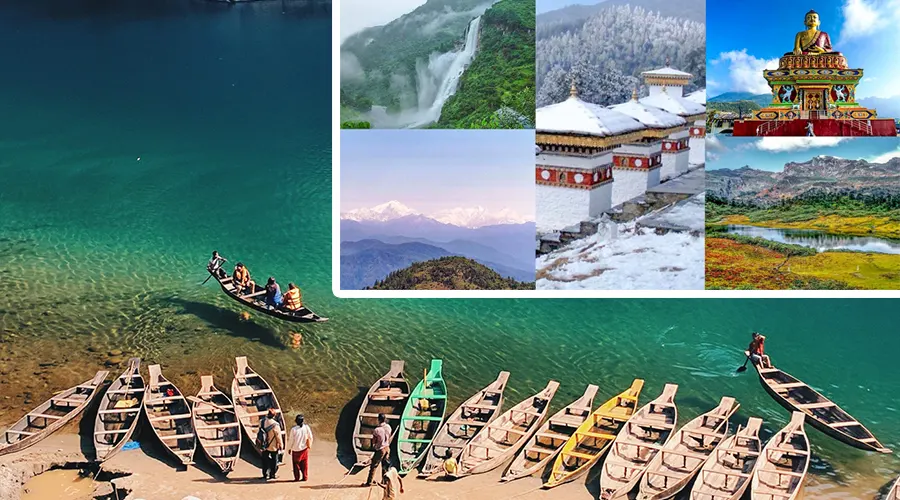Some fascinating facts about the Seven Sisters States in Northeast India
The Seven Sisters States in Northeast India are known for their unique culture, biodiversity, and stunning landscapes. Considered among the most gorgeous, wondrous, and least explored regions in the country, Northeast India is a wonderland. The region is blessed by Mother Nature and is fondly called the Seven Sisters States, which comprises Mizoram, Assam, Manipur, Meghalaya, Tripura, Arunachal Pradesh, and Nagaland. Each one of these states is bestowed with some unique feature.
Here are some fascinating facts about these states:
Seven Sisters States the Cultural Diversity
The Seven Sisters States are composed of Arunachal Pradesh, Assam, Manipur, Meghalaya, Mizoram, Nagaland, and Tripura. These states are home to over 200 distinct ethnic groups and languages, making it one of the most culturally diverse regions in India.
Northeast the Biodiversity Hotspot
The Northeastern region is a biodiversity hotspot, hosting a wide range of flora and fauna. It is home to rare and endangered species like the one-horned rhinoceros in Assam's Kaziranga National Park and the clouded leopard in Meghalaya.
Meghalaya’s Living Root Bridges
Meghalaya is famous for its living root bridges, which are formed by training the roots of rubber trees over rivers and streams. These bridges can last for centuries and are a unique example of indigenous engineering.
Nagaland’s Hornbill Festival
Nagaland celebrates the Hornbill Festival annually in December to showcase the rich cultural heritage of the state's Naga tribes. It features traditional music, dance, and sports, making it a vibrant and colorful event.
Meghalaya’s Capital Mawlynnong
Often referred to as "Asia's Cleanest Village," Mawlynnong in Meghalaya is known for its cleanliness and eco-friendly practices. It also boasts the unique tradition of matrilineal descent, where property and surnames are passed down through the mother's line.
Manipur’s Sangai Deer
Manipur is home to the Sangai deer, also known as the dancing deer, which is found exclusively in the Keibul Lamjao National Park. It is the state animal of Manipur and is considered a symbol of pride and conservation efforts.
Assam the Tea Capital
Assam is one of the world's largest tea producers, known for its Assam tea, famous for its strong, bold flavor. The state's tea gardens are not only a source of livelihood but also offer picturesque landscapes.Top of Form
Tripura’s Grand Neermahal Palace
Tripura was ruled by the Manikya dynasty for a long time and the grand Neermahal Palace was constructed by the former Tripura King Bir Bikram Kishore Manikya Bahadur. It’s a breathtaking palace, set right in the heart of Rudrasagar Lake, and is a beautiful example of Hindu and Muslim styles of architecture.
Tawang is the birthplace of the sixth Dalai Lama
For those who don’t know, Tawang in Arunachal Pradesh is the birthplace of the sixth Dalai Lama, Tsangyang Gyatso. He was an unconventional man, who was noted for his love of wine and poetry.
Nagaland’s Dzukou Valley
Nagaland is spectacular and noted for its Dzukou Valley. People from near and far visit the state to witness the beauty of the rising sun from Dzukou Valley. This natural wonder is characterised by greenery, rare flowers, and a vast expanse of natural beauty. Truly magical!
Mizoram is the leading bamboo producer in India and home to Blue Mountain
Mizoram is the leading producer of bamboo in India. The name Mizoram is derived from the words Mizo, the self-described name of the native inhabitants, and Ram meaning land (land of the Mizos). Mizoram is also noted for its Blue Mountain or Phawngpui, which is the highest mountain range in the state.
Meghalaya, the wettest place on earth and living root bridges
No destination in India is as green as Meghalaya! The state is home to the wettest place on the planet, Mawsynram, and is also noted for its living root bridges which are unique to the world. These astounding bridges look magical and otherworldly.
Manipur, abode to the world’s only floating lake and national park
The lesser-explored state of northeast India, Manipur is home to the only floating lake on earth, Loktak Lake. The lake here also comprises Keibul Lamjao National Park, which is a swamp made of biomass vegetation called phumdis.
Assam is home to the world’s oldest operating refinery
DigBoi in Assam is prized for being the world’s oldest operating refinery, which has been operating since 1901. Digboi is a town in Tinsukia district of Assam, where the British first noticed oil on the feet of the elephants returning from the forest. Later, they asked the local laborers to dig the land for oil and kept exclaiming, “Dig Boy, Dig”,’ hence the name DigBoi.
These seven states, collectively known as the Seven Sisters, are truly unique and offer a rich tapestry of culture, nature, and traditions in India's northeastern corner.


Comments (0)